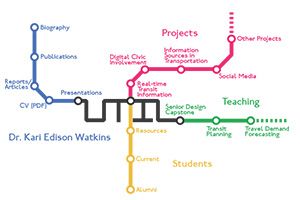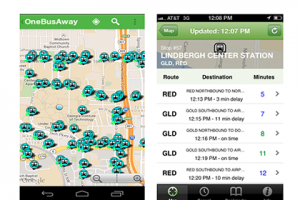The OneBusAway transit traveler information system gives users information about transit vehicle arrival times including real-time arrivals and schedule information. It is comprised of multiple interfaces to access information, including a website, a mobile-optimized website, and native applications for iPhone, Android and Windows platforms (see http://onebusaway.org). OneBusAway was developed under multiple federal grants as an open-source system allowing other transit agencies to adapt the code for their own systems. The initial development took place at the University of Washington and the Seattle instance still serves over 100,000 unique weekly users. The platform is also now used in Tampa and Washington DC and as the backbone of MTA New York's BusTime.
<br/></br/>
Here in Atlanta, the Urban Transportation Information Lab (UTIL) has worked to create a local version of OneBusAway using funding from Georgia Tech's GVU Center, the Institute for People and Technology (IPAT) and the National Center for Transportation Systems Productivity and Management (NCTSPM). We have integrated all of MARTA's train and bus real-time information, Georgia Tech's trolley and shuttle real-time information and schedule data from multiple area agencies (see http://atlanta.onebusaway.org). Additional transit services are being added over time. We are using the platform to conduct an evaluation of its impacts on transit riders, specifically using smart card data to quantify the increase in trips. Previous studies of real-time transit information have demonstrated a number of user benefits, including decreases in perceived and actual waiting times, as well as increases in the frequency of travel and customer satisfaction.

Under the direction of Dr. Kari Edison Watkins in Civil & Environmental Engineering, UTIL conducts research to improve sustainable transportation through better information. The members of the lab are interested in real-time information for transit, open data to enable the creation of tools to overcome barriers to transit use and digital civic engagement to solve transportation problems.



